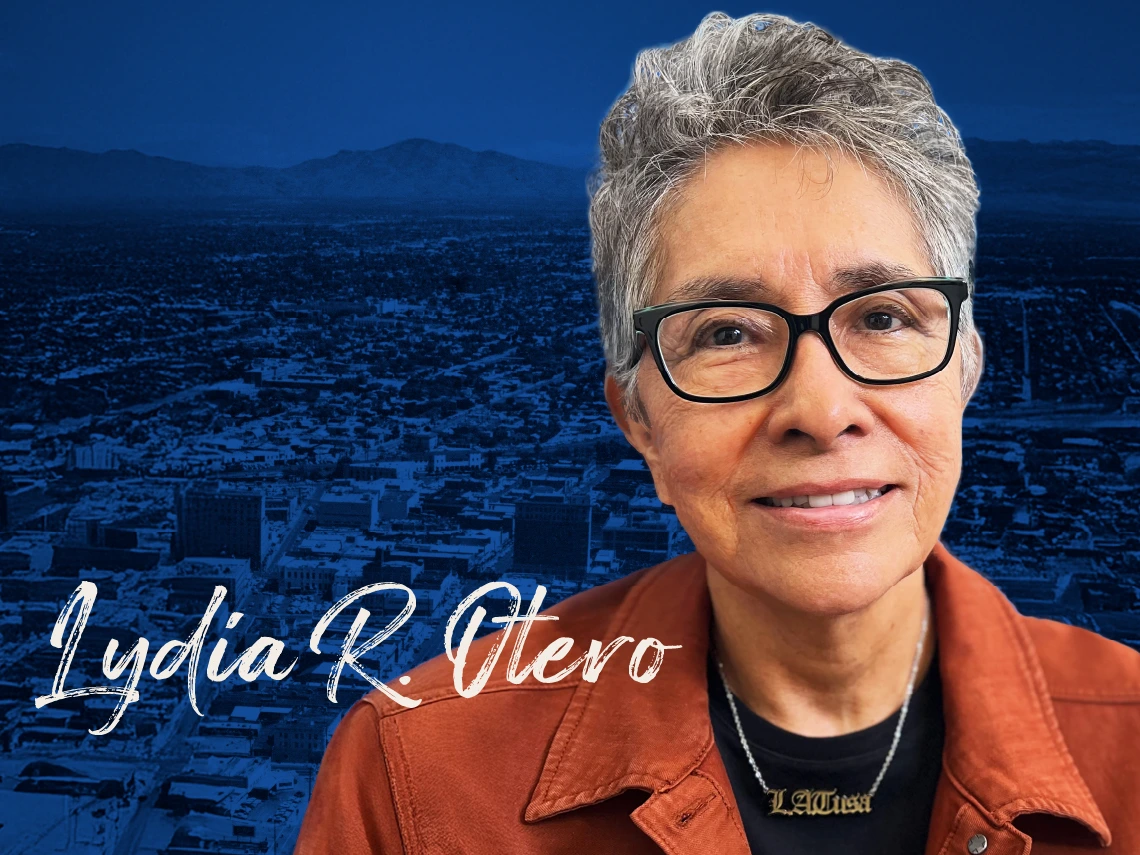University of Arizona Libraries acquire archive of Dr. Lydia R. Otero
Materials donated by the author, activist, historian provide more inclusive insight on Tucson's social and economic history

Archives hold the potential to inform and educate us about the everyday lives and labor of individuals often overlooked in research projects and traditional histories.
The University of Arizona Libraries Special Collections is excited to announce the acquisition of the archive of author, activist, and historian Lydia R. Otero.
Born and raised in Tucson, Arizona, Associate Professor Emeritus Otero served as a faculty member in the Department of Mexican American Studies in the U of A College of Social and Behavioral Sciences from 2003 to 2020. The donated collection includes materials from Alianza Hispano-Americana, a mutual aid society founded in 1894 in Tucson that offered low-cost life insurance, social activities, and other services to Mexicans and Mexican Americans in the southwest; interviews from Otero’s projects; professional and research files; and personal family materials and heirlooms.
Changing the definition of an archive
“In the past, archives primarily focused on preserving the records of influential and accomplished figures in business and politics,” said Otero.
Today, archives provide information from people who have valuable stories and experiences that may not be shared or available to the public. The Lydia R. Otero Papers collection features photographs and annotations, connecting and providing insight into a working-class family's everyday barrio life to broader historical narratives of the region.
“My collection includes deeply personal items that challenge traditional notions of what is deemed ‘worthy’ of preservation,” said Otero. “My brother’s hand-painted lunchbox symbolizes overlooked lives and stories in Tucson’s history of redevelopment and the human costs of what most consider progress.”
Providing a local perspective of the Tucson community is essential.
Arizona Insights Speaker Series launches February 14 to celebrate the acquisition
Join Special Collections to celebrate the acquisition with the launch of Otero’s Arizona Insights Speaker Series, an event that will be held annually on Arizona Statehood Day to explore key topics in the state’s history.
Otero will discuss the evolution of their collection and its significance for researchers, students, and the public.
Event details
- Arizona Insights: Historical and Cultural Legacies Speaker Series
- Friday, Feb. 14, 10:30am-noon
- Special Collections Reading Room, University of Arizona, 1510 E. University Blvd.
- Free and open to the public
- Register now
Otero's book, La Calle, will be available for purchase.
For questions regarding disability-related accommodations, contact Irisbeltsi Enriquez-Gutierrez, ienriquez@arizona.edu.
The impact of the Otero Papers on local, regional, national research and history
The Otero Papers will be a part of the Special Collections Borderlands and Arizona and Southwest collecting areas, which document the culture and history in both regions. The materials will be accessible to researchers, students, and the public in February.
Items from the archive will be on display at the February 14 Arizona Insights event.
Some of the materials focus on urban renewal projects in downtown Tucson and will add to the national conversation on similar efforts in the United States that have led to displacing communities for redevelopment projects in other cities.
Verónica Reyes-Escudero, the Katheryne B. Willock Head of Special Collections, recognizes that it is an honor that Otero trusts their collection to be with the University Libraries Special Collections.
“The research materials that Dr. Otero has amassed about Tucson, including interviews with local people, will be of great interest to the local community,” said Reyes-Escudero. “This archive is important because it will not only add to the collection content that we have, but it represents and mirrors the students here at a Hispanic Serving Institution. It helps with our efforts to engage our students in a way that they can also contribute when they see themselves in a collection.”
Otero believes that student research projects, such as interviewing pioneers in bilingual education conducted in departments like Mexican American Studies, add another layer of insight from a collection like this.
“The archival materials document the contributions of individuals whose labor quietly kept the city running,” said Otero. “Their greatest accomplishments might have been raising a family, ensuring their children graduated high school, or simply surviving the displacement from their homes.”
At the same time, researchers and scholars also benefit from accessing materials they may not expect to discover in Special Collections.
“Researchers might find value in my mother’s pay stubs, which highlight the contributions of thousands of brown women from the barrios who worked tirelessly behind the scenes in Tucson’s tourist industry,” said Otero. “In a community like Tucson, archives that include materials from working-class families provide an essential perspective.”
“These records have the power to foster a more inclusive understanding of Tucson’s social and economic history.”
About Dr. Lydia R. Otero
Born and raised in Tucson, Arizona, Lydia R. Otero served as a faculty member in the Department of Mexican American Studies in the University of Arizona College of Social and Behavioral Sciences from 2003 to 2020. An author, activist, and historian, they specialize in urbanization and placemaking, urban renewal, public history, and their work focuses on ethnicity, place, and personhood.
Otero graduated from Pueblo High School (1973) in Tucson, received their M.A. in History from California State University, Los Angeles (1995) and received their Ph.D. in History from the University of Arizona (2003). Their works include La Calle: Spatial Conflicts and Urban Renewal in a Southwestern City (2010), In the Shadows of the Freeway: Growing Up Queer (2019), and L.A. Interchanges: A Brown and Queer Archival Memoir (2023). La Calle, published by the University of Arizona Press, won a Southwest Book Award from the Border Regional Library Association for its depiction of personhood, place, urbanization of 80 acres of downtown Tucson that deeply impacted the Mexican American and other communities (2011). In the Shadows of the Freeway, a woven personal memoir and exploration of historical archival records, was selected as one of the Pima County Public Library’s Southwest Books of the Year (2021).
